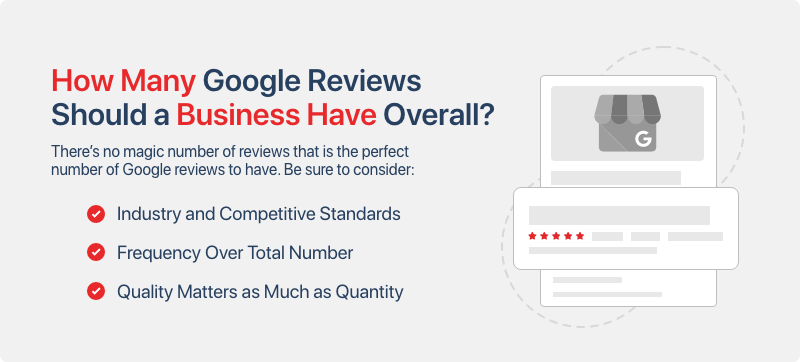
Google reviews play a crucial role in helping businesses establish credibility, attract new customers, and improve their rankings on Google.
But one of the most common questions business owners have is, "How many Google reviews do I need to rank on Google?" This question has no one-size-fits-all answer, as the number of reviews needed to start ranking depends on various factors.
In this article, we'll explore how many reviews you may need to begin ranking, how to offset negative reviews, and what it takes to work toward a 5-star rating. Whether you're just starting out or trying to optimize an established Google Business Profile, this guide will offer key insights and tips to help you leverage reviews for greater success on Google!
How Many Google Reviews Do I Need To Start Ranking?
If you ask different local SEO professionals the question, "how many Google Reviews do I need to start ranking on Google," you're probably going to get a variety of answers. This is because the exact number of reviews you need to start ranking is dependent on many different factors, including your location, industry, GBP categories, competition, average review score, and others.
However, the number that frequently gets thrown out there is 10, meaning most businesses need to get approximately 10 Google Reviews to start ranking in local searches. But again, the exact number can vary. Businesses in certain areas or industries, or those with less competition or niche categories might only need 5 reviews to start ranking, for example, but 10 is a good starting goal for all businesses to shoot for.
It's important to note that these reviews should also mostly be 5-star and 4-star reviews, as businesses with overall review ratings in the 4- to 5-star range rank the best on Google. A single 1- or 2-star review could set you back, resulting in you needing more than 10 reviews to start ranking on Google.
How Many Positive Google Reviews Do I Need To Offset a Negative Review?
To offset a negative Google review, you'll generally need more than one positive review to raise your average review score up by a single decimal point, though the exact number depends on factors like your current average rating, the rating of the new positive reviews, and the weight Google's algorithm gives to each review.
The higher your current rating, the harder it is to maintain or improve, so more positive reviews are needed to counter a single negative review. Additionally, if you have fewer total reviews, a single negative review will have a bigger impact. For example, if you have only five reviews and your current overall review score is 5 stars, a single 1-star review will drop your average significantly, down to just above 4.
If you have fewer than 10 reviews, you might be able to increase your review score to the next level (i.e., 4.3) after a negative review brings it down by getting just 1 or 2 positive reviews. But what if your average review score dropped from 5 to 4.2, and you want to recover and get back as close to 5 stars as possible again? In this case you would need approximately 15 new good reviews to bring your overall score back up to 4.8.
For businesses with a larger number of reviews, each new review has a smaller effect. For instance, a business with around 50 reviews would need 10 to 20 new positive reviews to increase its average review score by one decimal point after a negative review brings it down.
How Many Google Reviews You Need To Get 5 Stars
Getting a perfect 5-star rating on your Google Business Profile is only possible if every single review you receive is 5 stars, since the overall rating is an average of the scores from all your reviews. That being said, you can get very close to 5 stars on Google if you get enough 5-star reviews over time.
How Many Google Reviews Do I Need To Get To 5 Stars: Calculator
Here's a Google Review calculator you can use to calculate how many 5-star reviews you need to increase your overall review score, inching as close to a 5-star score as possible. Simply plug in your current Google rating, your total number of reviews, and your desired review score.
As an example, if you have a current Google rating of 4.7 stars from a total of 25 reviews, and you set a goal of 5 stars, the Google review calculator will let you know that you need 13 new 5-star reviews to raise your overall rating to the next level, or 4.8.
Even if you can never get your overall review score to 5, there's no reason to despair. There's evidence that customers actually prefer to purchase from businesses with review ratings between 4.2 and 4.7, as they perceive them to be more authentic, while businesses with perfect 5-star ratings are often seen as "too good to be true."
How Many Google Reviews Should a Business Have Overall?
There's no magic number of reviews that is the perfect number of Google reviews to have. If you want to keep ranking on Google and competing effectively, you need to aim to collect a steady stream of positive reviews each month.
In general, having more reviews signals to potential customers that your business is trustworthy and actively engaged. However, the right number for your business depends on your industry, competition, and customer base.
Industry and Competitive Standards
If your competitors have 50 reviews and you have 5, it may deter potential customers or clients from choosing you, even if your rating is high, not to mention you're probably going to rank far below them in local search results.
Ideally, you should aim to match or exceed the review count of similar local businesses to stay competitive.
Frequency Over Total Number
Instead of focusing solely on accumulating a certain number of reviews, prioritize collecting them consistently. Google values businesses that maintain active engagement with their customers, so a steady stream of fresh, positive reviews can improve your search ranking and reputation.
Aim for at least a few new reviews each month to show that your business is active and relevant.
Quality Matters as Much as Quantity
While having more reviews is beneficial, the quality of those reviews is equally important, especially when it comes to converting leads. A small number of highly detailed positive reviews can be more persuasive to potential customers than a larger number of generic or brief ones.
When asking for reviews, encourage customers to share specifics about their experience, such as mentioning what they liked, the staff they interacted with, or product or service highlights.
Not only can detailed reviews help influence potential customers, they can also provide valuable sentiment insights that you can use to implement positive business changes, ultimately leading to more positive reviews as you improve upon your business's service and offerings.
You can even use Local Falcon's Reviews Analysis tool to conduct AI-driven sentiment analysis of all your Google reviews at once, turning feedback into actionable insights!
The Bottom Line
Building and maintaining a strong base of Google reviews is essential to staying competitive in local search results.
By consistently collecting positive, high-quality reviews and strategically managing negative ones, you can improve your online reputation, gain credibility, and boost your rankings in local search results.
While there isn't a perfect number of Google reviews every business should aim for, focusing on steady growth, competitive benchmarks, and authentic feedback is the key.
With a balanced approach to review management, your business can both achieve higher visibility on Google and foster trust with prospective customers, ultimately supporting your long-term growth and success!


